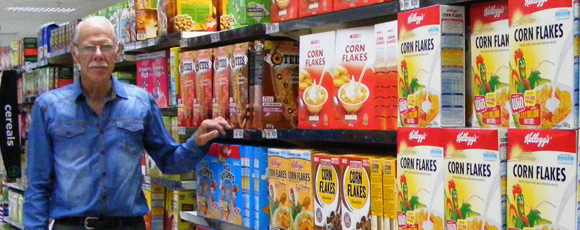Retailers should speak up in the GM debate

Wynand van der Walt suggests that retailers have a duty to better inform their consumers about food safety. Image by Wynand van der Walt.
South Africa is one of the biggest growers of genetically modified (GM) crops in the world: 87% of maize, 92% of soybeans, and 100% of cotton grown in the country is GM. These crops have been engineered either for insect resistance, herbicide tolerance, or both, which has resulted in lower production costs for farmers and, ultimately, lower food prices and improved food security for consumers.
Retail giant Woolworths recently announced it will be halving the number of private-label products containing GM ingredients on their shelves. It also committed to reducing GM components in their food products within 12 months, citing consumer demand as the driving force.
The implications of these decisions could be far-reaching.
Wynand van der Walt, an agricultural biotechnology consultant and an expert on GM regulation in South Africa, says that for Woolworths to comply with their promise, they will likely need to source ingredients from outside of the country, driving up the cost of food and ultimately transferring that cost onto the consumer. “In the modern economy, any added production cost is a de facto tax on the consumer.”
But it seems that the move by Woolworths is just a symptom of a bigger problem when it comes to communicating with consumers about GM products.
“The food industry has not been visible and active with respect to crop biotechnology, and for that I criticise them,” says van der Walt. “I respect the industry’s right to choose non-GM or whether to label products, but it has ducked and dived.”
Woolworths has actually made some effort to inform their consumers – for example, there is a FAQ section on their website that addresses some of the debates around GM crops and safety. They also clearly label their products where possible.
But generally speaking, labelling of GM products is still a big problem in SA, says van der Walt, and it is not just the industry that is at fault. Conflicting regulations, poorly defined food categories and a lack of facilities makes compliance extremely difficult.
Take, for instance, new legislation introduced by the Department of Trade and Industry (DTI) in 2006 governing the labelling of food products. Van der Walt provided expert input during the drafting of this act and associated regulations, but he says these conflict with existing Department of Health’s GM labelling legislation, and the regulations cannot really be complied with.
Of particular concern is the lack of facilities to check the GM content of food products. He says the Department of Agriculture, Forestry and Fisheries (DAFF) acknowledges only two laboratories that can conduct this testing in order to issue a certificate on GM presence, but there are millions of products that need this certification. “How could we then expect all products to comply?” he asks.
Earlier this year, Woolworths ran into a different sort of labelling issue when it came to light that it was labelling its milk as “rBST-free”. rBST stands for recombinant Bovine somatotropin, an essential hormone for cows to produce milk.
The hormone that occurs naturally in cows is just called BST; rBST is the same hormone, but it is produced in bacteria and then injected into dairy cows to increase milk production. Bacterial manufacture of the hormone is considered cheaper and more humane than breeding and feeding other cows for high milk production.
The problem is that there is no way to differentiate between rBST and natural BST in milk testing. Thus, the claim that milk is rBST-free cannot be substantiated . As a result, DAFF instructed Woolworths to remove this claim from their milk labels.
According to van der Walt, this is another example of a decision that is ostensibly due to consumer demand, but with the net result of potentially driving up prices for consumers.
“In all this time, not one supermarket has stood up in their advertising and said, ‘The food I’m selling you is safe, whether GM or not,’” says van der Walt. “No-one is willing to stand up and defend themselves. It’s a cop-out. By not defending themselves, they add credibility to the (anti-GM) attackers.”
What van der Walt is really saying, is that the consumer needs more information about what GM really means for them, the economy and the environment.
Disclaimer: The Public Understanding of Biotechnology programme has a mandate to provide neutral and objective information on GM crops to the South African public. More information on GMOs is available through BioSafety South Africa.
Van der Walt is an eighth generation South African citizen, born and bred in the Tzitzikamma. He worked for the Department of Agriculture and a multinational seed company and later founded and managed SANSOR as seed industry secretariat. He retired in 2002, and presently serves as an independent consultant for the agri-industry.
|
|